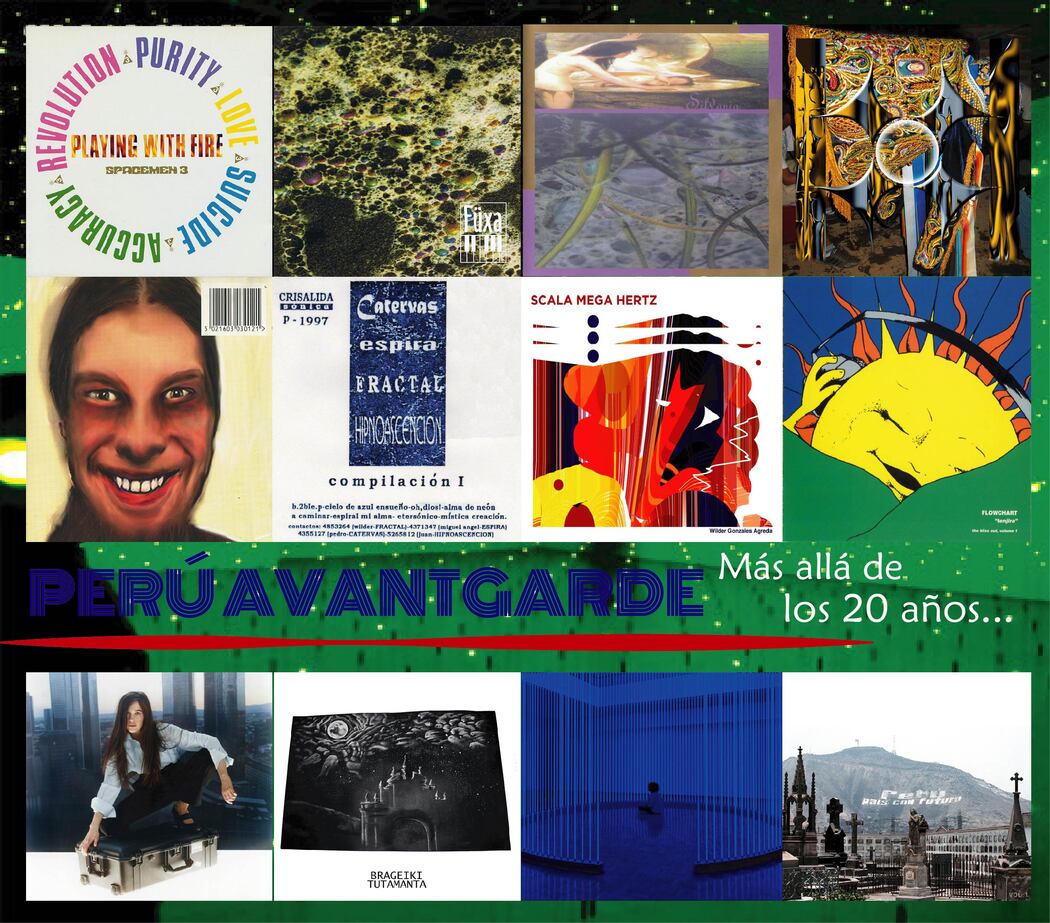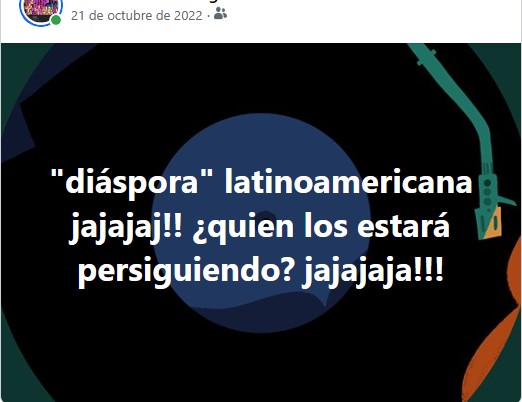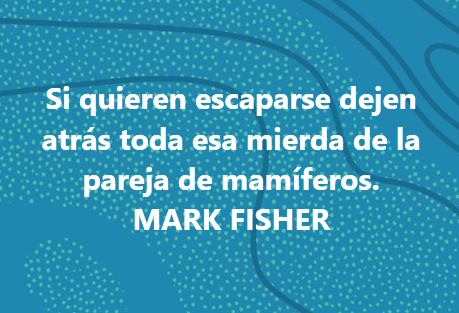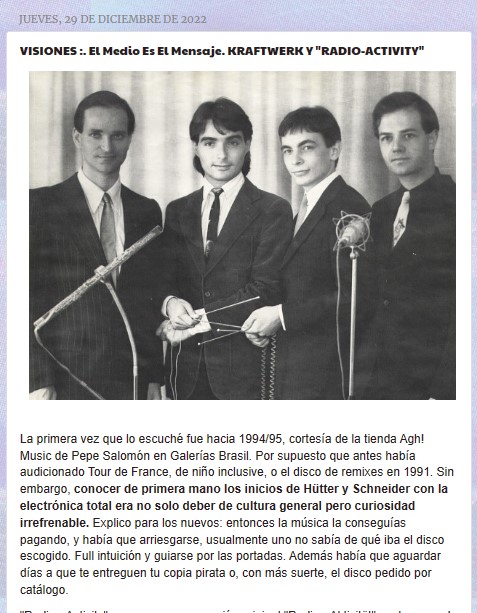Spacemen 3 lo estaban orbitando todo….
... El manager y empresario espacial Gerald Palmer se quedó a un lado contemplando el espectáculo extrañamente hipnótico. Sonic y Jason fumaban una gran cantidad de cigarrillos enrollados entre las partes de la guitarra. Smoke 'n' riff. Smoke 'n' riff. El evidente disgusto de Palmer por el horrendo estruendo coincidía con los sentimientos de casi todos los pasajeros que estaban inactivos en el bar.
Había aprobado el concierto para la banda pero, después de presenciar la recepción rebelde, reconsideró su decisión. Unos cuantos trajes borrachos soltaron palabrotas desde el bar, mientras un ambiente de creciente resistencia amenazaba con neutralizar una manta eléctrica cada vez más voluminosa. Los sonidos comenzaron a amoldarse a la arquitectura del vestíbulo, erigiendo una losa de texturas multivalentes y tonos interválicos, hasta que las cabezas comenzaron a dar vueltas y las tripas retumbaron.
Sentado cerca estaba Pat Fish, el guitarrista de The Jazz Butcher, que había acompañado a The Spacemen al Art Center con planes de unirse a ellos después de un intermedio. Pero rápidamente se hizo evidente para él, mientras se sentaba entre los pasajeros rebeldes en el bar, que un motín sería mucho más probable que un segundo “set”.
PAT FISH: Verás, había un plan y luego estaba lo que realmente sucedió. Y era jodidamente hermoso, pero en este entorno era realmente molesto para la gente. Había bastante ruido en la sala. Y hay toda esta gente de clase media que viene a ver una película alemana o algo así, ya sabes. Y los ánimos comenzaban a deshilacharse.
Diez minutos después de lo que se había anunciado como 'An Evening of Contemporary Sitar Music' y los primeros riffs de 'Honey' de Spacemen 3, el zumbido del drone de gelatina, sucediendo rápidamente a partir de un tenso ascenso de tañidos de guitarra. Jason contraataca con frases que timbran, fragmentos e insinuaciones de "Come Down Softly To My Soul" acelerando en un ritmo casi cerrado antes de evaporarse en el zumbido circundante. Repetición ad infinitum. La guitarra de Sonic sorbe el amplificador Vox en una fase natural, como una cañita lo haría con una cola oscura. El repetidor delay une nucleoides de energía audible (hasta ahora ondas anónimas en el espacio) como momentos aleatorios en el tiempo. Repetición ad nauseam.
Quince minutos después, Sonic y Jason llegan a un clímax y caen en cascada sin esfuerzo a un silbido borroso. Unas cuantas camisetas rellenas de alivio asoman desde sus vasos hacia la barra y se dirigen hacia el batido estruendo de la retroalimentación. El ruido se reduce a un pulso constante. Las cabezas se mueven: "¡¿Ya han terminado?!" Pero luego los débiles chasquidos de la guitarra se encienden y se propagan una vez más, golpeando la carne blanda cada vez más fuerte. Alguien enojado: "¡Cállense idiotas!" En capas entre el vibrante riff 'Honey' de Sonic y las rotaciones modulares de Jason, la transmisión crepitante del PA anuncia asientos de último minuto para "Wings Of Desire" en el teatro adyacente.
PAT FISH: Y, alrededor de la marca de los 30 minutos, supongo, fui al bar a tomar una copa. Y juro por Dios que lo que les voy a decir es la verdad del Evangelio, palabra por palabra. Estaba en el bar y hay dos viejos de unos 40 o 50 años bebiendo cerveza. Y obviamente estaban totalmente disgustados con la música, ya sabes. Y uno le dijo al otro: "¡Pensar que Elvis murió por esto!"
Un miembro rígido y almidonado de la dirección de The Waterman Art Center buscó desesperadamente a Palmer entre la menguante multitud. Gerald asintió amablemente mientras la mujer fatigada pagaba la tarifa necesaria de £ 100 y sonrió cortésmente hacia su banda como diciendo: "Vale la pena cada centavo, ¿eh?" El gerente respondió ofreciendo dos billetes más de 50 libras esterlinas si se detenían.
No lo hicieron. Más bien, después de hacer una pausa para una interrupción final del intercomunicador, cuyo petulante gemido atrae a la mayor parte de la multitud que espera al teatro, el mantra de The Spacemen continúa. Después de 45 minutos completos, Sonic se contenta con la solución de sonido que gotea ante ellos, y cautelosamente le hace una señal a la banda, mientras se cierran en diminuendo a un zumbido tenue de corriente eléctrica. Hay algunos aplausos de reconocimiento, aunque sobre todo de conocidos, que, como los mirones dispépticos, miran con igual alivio.
PAT FISH: Este chico que estaba a cargo del bar subió. Llevaba esta camisa y corbata impecablemente planchada a rayas azules y blancas. Era un verdadero dandy. Se acerca a Sonic y dice: "Um, me temo que nuestros clientes no aprecian particularmente tu forma particular de minimalismo". Así fue como lo expresó. Obviamente estaba un poco asustado. Fue algo aterrador lo que acababan de hacer. Fue algo realmente aterrador. La gente no hacía eso en Londres. Y mucho menos en una multitud de personas que se arremolinaban tratando de ir al teatro. Así que volvimos al camerino, que no tenía ventanas, era como un tablero de tazas. Y entramos allí y te puedes imaginar cómo eran esos cabrones, quiero decir que fumaban droga sin parar todo el tiempo. Y nos quedamos allí hasta aproximadamente el momento en que hubiéramos terminado el segundo set. Luego volvimos a Rugby. Y sí, eso es todo lo que tengo que hacer todo el día, y tal vez parecer lo suficientemente grande y amenazante como para asustar a los tipos que querían golpear a Sonic. Fue realmente extraño. La gente realmente se estaba ofendiendo por eso. Y en ese momento fue una experiencia bastante estresante estar allí, aunque la música era muy hermosa. Fue extraño cuando salió el disco y la gente decía: "Oh, la serenidad". Si hubieras estado allí, no te habrías sentido de esa manera específicamente... era un poco más como, "¡Empaquen el equipo y salgamos de aquí, muchachos!"
Bautizada como DREAMWEAPON, esta actuación de 1988 de Spacemen 3, aunque dura menos de una hora, es tanto un punto divisorio como la consumación de un linaje de no-eventos anarco-musicales contenidos dentro de una línea de sangre que une todos los movimientos en el underground. Se remonta a finales del siglo anterior y vincula inextricablemente los sonidos de la vanguardia musical con las palabras de sus provocadores poéticos. De hecho, si Debussy fue, en su momento más seminal, la exposición sonora de las partituras literarias de Mallarmé, entonces, un siglo después, Spacemen 3 desarrolló un experimento progresivo de alquimia analógica que no solo hace referencia a este pasado, sino que también ilustra con sonido el cada vez más ficticio/astral tejido social explorado en los hornos candentes de la Trilogía Nova de Burroughs, el ambiente termodinámico de la Entropía de Pynchon, El ruido blanco de DeLillo, Ubik de Philip K. Dick o Crash de JG Ballard. El enamoramiento por los SUEÑOS, magnificado tan vívidamente por los simbolistas del siglo XIX, se había convertido a fines del siglo XX en un fetiche científico dedicado a los mundos mecanizados del espacio interior y exterior. Las dos mayores obsesiones de la segunda mitad del siglo XX se habían convertido en ARMAS y SUEÑOS, marcados por dos recuerdos duraderos cortesía del hogar terrestre de Spacemen 3, Rugby: el motor a reacción y el holograma.
ERIK MORSE
Spacemen 3 and the birth of Spiritualized
LAUNCHING THE DREAMWEAPON
Spacemen 3 were orbiting it all….
...Businessman and Spacemen impresario Gerald Palmer stood off to the side gazing at the oddly hypnotic spectacle. Sonic and Jason puffed on a vast quantity of rolled cigarettes between guitar-parts. Smoke ‘n’ riff. Smoke ‘n’ riff. Palmer’s patent distaste for the horrendous din matched the sentiments of nearly every punter idling at the bar.
He’d approved the gig for the band but, after witnessing the unruly reception, second-guessed his decision. A few drunken suits cursed from the bar, as an ambience of mounting resistance threatened to neutralise an increasingly voluminous electric blanket. The sounds began to shape themselves to the architecture of the lobby, erecting a slab of multivalent textures and intervallic tones, until heads began to spin and bowels rumble.
Seated nearby was Pat Fish, The Jazz Butcher guitarist, who’d accompanied The Spacemen to the Art Centre with plans to join them after an intermission. But it quickly became evident to him, as he sat among the unruly punters at the bar, that a mutiny would be far more likely than a second “set”.
PAT FISH: You see, there was a plan and then there was what actually happened. And it was fucking beautiful, but in this setting it was really, really annoying people. It was quite loud in the room. And there’s like all these middle-class people coming in to see some German film or something, ya know. And tempers were beginning to fray.
Ten minutes into what had been billed as ‘An Evening of Contemporary Sitar’ and the first riffs of Spacemen 3’s ‘Honey’ zoink from the gelatine drone, succeeding quickly from a tense ascendance of guitar pings. Jason counters with ringing phrases, bits and bobs of ‘Come Down Softly To My Soul’ accelerating into a near lock groove before evaporating into the surrounding hum. Repetitio ad infinitum. Sonic’s guitar slurps the Vox amp in a natural phase, as a straw might a dark cola. The repeater-delay binds nucleoids of audible energy (hitherto anonymous ripples in space) together as random moments in time. Repetitio adnauseam.
Fifteen minutes in, Sonic and Jason build to a climax and effortlessly cascade to a blurbed hissing. A few relieved stuffed-shirts peer up from their glasses at the bar and toward the bathetic rumble of feedback. The noise slows to a steady pulse. Heads shift around: “Are they fuckin’ done yet?!” But then the faint clicks of guitar ignite and mushroom once again, pounding soft flesh ever louder. Someonehuffs: “Shut up you fuckin’ twats!” Layered between Sonic’s vibrating ‘Honey’ riff and Jason’s modular rotations, the PA’s crackled transmission announces last-minute seating for Wings Of Desire in the adjacent theatre.
PAT FISH: And, round about the sorta 30-minute mark I guess, I went to the bar to get a drink. And I swear to God that what I’m going to tell you is gospel truth word for word. I was at the bar and there’s these two old boys about 40 or 50 drinking their beer. And they were obviously totally disgusted with the music, ya know. And one said to the other, “To think that Elvis died for this!”
A stiff and starched member of The Waterman’s Art Centre management desperately sought out Palmer in the dwindling crowd. Gerald nodded pleasantly as the fatigued woman paid the necessary £100 fee and smiled politely toward his band as if to say, “Worth every penny, huh?” The manager responded by offering two more £50 notes if they stopped.
They didn’t. Rather, after pausing for a final interruption from the intercom, whose petulant whine draws the bulk of the waiting crowd into the theatre, The Spacemen mantra continues. After a full 45 minutes, Sonic contents himself with the sound-solution dribbling before them, and gingerly signals the band, as they close diminuendo to a fainthum of electric current. There are a few claps of recognition, though mostly from acquaintances, who like the dyspeptic gawkers, look on with equal relief.
PAT FISH: This lad who was in charge of the bar came up. He had this immaculately pressed blue and white striped shirt and tie. He was a real dandy. Comes up to Sonic and goes, “Um, I’m afraid our patrons don’t particularly appreciate your particular form of minimalism.” It was just the way he put it. He was obviously a bit scared. It was a scary thing what they had just done. It was a really scary thing. People did not do that in London. Least of all in a crowd of people just milling about trying to go to the theatre. So we went back to the dressing room, which had no windows at all, it was like a cup board. And we went in there and you can imagine what those buggers were like, I mean they were chain-smoking dope all the time. And we just stayed there until round about the time we would have finished the second set. Then we went back to Rugby. And yeah that’s all I got to do all day, and maybe look big and threatening enough to scare off the blokes who wanted to punch Sonic. It was really weird. People were really taking offence at it. And at the time it was quite a stressful experience to be there although the music was very beautiful. It was odd when the record came out and people were going, “Oh the serenity.” Had you been there you wouldn’t have felt that way about it specifically… it was a bit more like, “Pack up the kit and we’ll get out of here alive lads!”
Christened DREAMWEAPON, this 1988 performance by Spacemen 3, although clocking in at less than an hour, stands as both a dividing point and consummation of a lineage of anarcho-musico “non”-events contained within a bloodline that binds all movements in the underground back to the close of the previous century and inextricably links the sounds of the musical vanguard with the words of its poetic provocateurs. In fact, if Debussy was, at his most seminal, the sonic exposition of Mallarmé’s literary scores, then one century later Spacemen 3 developed a progressive experiment into analogue alchemy that not only references this past,but also illustrates with sound the increasingly fictitious/astral social-fabric explored in the white-hot ovens of Burroughs’Nova Trilogy, the thermodynamic ambience of Pynchon’s ‘Entropy’, DeLillo’s White Noise, Philip K. Dick’s Ubik, or J.G. Ballard’s Crash. The infatuation with DREAMS, magnified so vividly by the 19th-century Symbolists, had by the end of the late 20th century become a scientific fetish devoted to the mechanised worlds of inner-and outer-space. The two greatest obsessions of the second half of the 20th century had become WEAPONS and DREAMS, marked by two lasting memorabilia courtesy of Spacemen 3’s terrestrial home of Rugby: the jet engine and the hologram.
Spacemen 3 and the birth of Spiritualized















